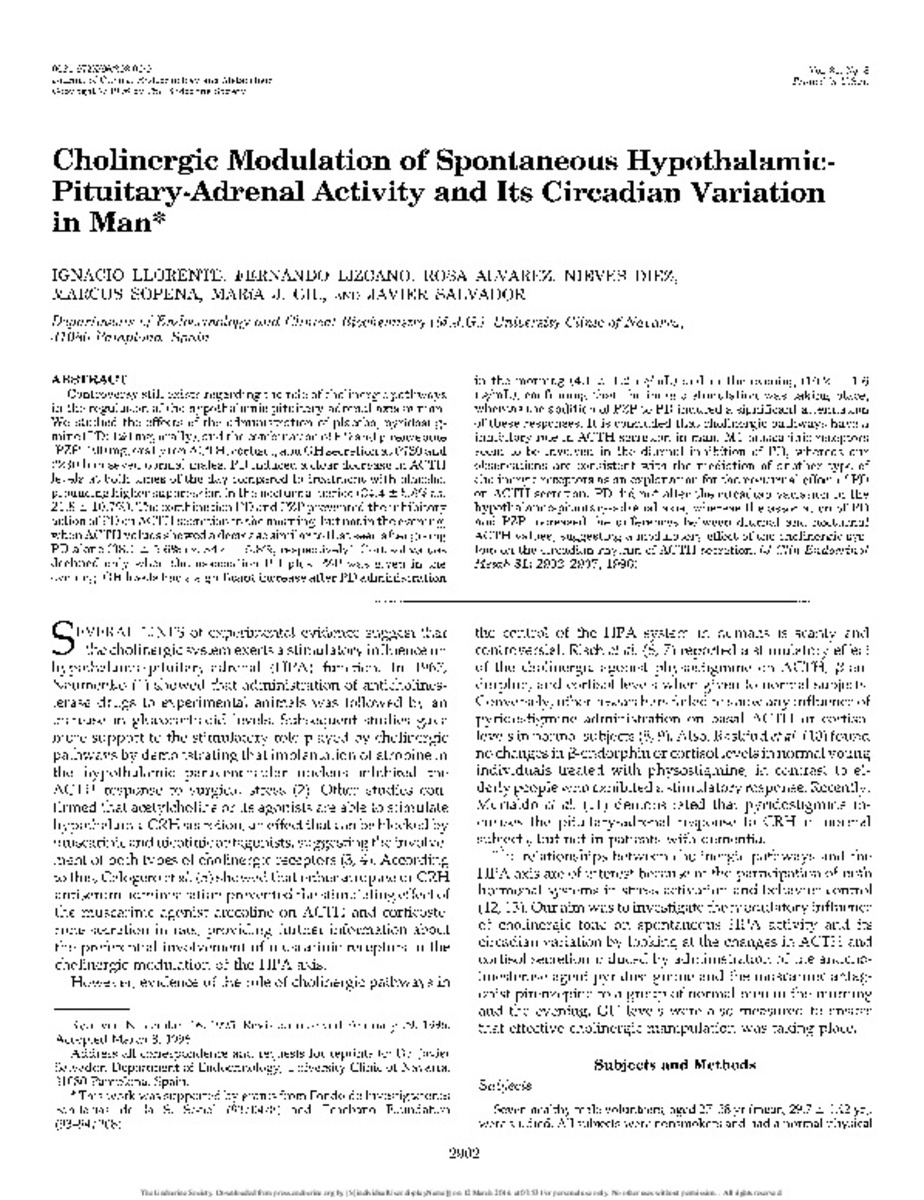Full metadata record
| DC Field | Value | Language |
|---|---|---|
| dc.creator | Llorente, I. (Ignacio) | - |
| dc.creator | Lizcano, F. (Fernando) | - |
| dc.creator | Alvarez, R. (Rosa) | - |
| dc.creator | Diez-Goñi, N. (Nieves) | - |
| dc.creator | Sopena, M. (Marcos) | - |
| dc.creator | Gil, M.J. (María José) | - |
| dc.creator | Salvador, J. (Javier) | - |
| dc.date.accessioned | 2014-03-12T15:12:32Z | - |
| dc.date.available | 2014-03-12T15:12:32Z | - |
| dc.date.issued | 1996 | - |
| dc.identifier.citation | Llorente I, Lizcano F, Alvarez R, Diez N, Sopena M, Gil MJ, et al. Cholinergic modulation of spontaneous hypothalamic-pituitary-adrenal activity and its circadian variation in man. J Clin Endocrinol Metab. 1996 Aug;81(8):2902-7. | es_ES |
| dc.identifier.issn | 0021-972x | - |
| dc.identifier.uri | https://hdl.handle.net/10171/35489 | - |
| dc.description.abstract | Controversy still exists regarding the role of cholinergic pathways in the regulation of the hypothalamic-pituitary-adrenal axis in man. We studied the effects of the administration of placebo, pyridostigmine (PD); 120 mg, orally), and the combination of PD and pirenzepine (PZP; 100 mg, orally) on ACTH, cortisol, and GH secretion at 0730 and 2230 h in seven normal males. PD induced a clear decrease in ACTH levels at both times of the day compared to treatment with placebo, producing higher suppression in the nocturnal period (34.4 +/- 5.8% vs. 21.8 +/- 10.7%). The combination PD and PZP prevented the inhibitory action of PD on ACTH secretion in the morning, but not in the evening, when ACTH values showed a decrease similar to that seen after giving PD alone (38.1 +/- 5.6% vs. 34.4 +/- 5.8%, respectively). Cortisol values declined only when the association PD plus PZP was given in the evening. GH levels had a significant increase after PD administration in the morning (4.1 +/- 1.2 ng/mL) and in the evening (10.2 +/- 1.6 ng/mL), confirming that cholinergic stimulation was taking place, whereas the addition of PZP to PD induced a significant attenuation of these responses. It is concluded that cholinergic pathways have a inhibitory role in ACTH secretion in man. M1 muscarinic receptors seem to be involved in the diurnal inhibition of PD, whereas our observations are consistent with the mediation of another type of cholinergic receptors as an explanation for the nocturnal effect of PD on ACTH secretion. PD did not alter the circadian variation in the hypothalamic-pituitary-adrenal axis, whereas the association of PD and PZP increased the differences between diurnal and nocturnal ACTH values, suggesting a modulatory effect of the cholinergic system on the circadian rhythm of ACTH secretion. | es_ES |
| dc.language.iso | eng | es_ES |
| dc.publisher | The endocrine society | es_ES |
| dc.rights | info:eu-repo/semantics/openAccess | es_ES |
| dc.rights | info:eu-repo/semantics/openAccess | es_ES |
| dc.subject | Circadian Rhythm | es_ES |
| dc.subject | Hypothalamo-Hypophyseal | es_ES |
| dc.subject | Parasympathetic Nervous | es_ES |
| dc.subject | Pituitary-Adrenal System | es_ES |
| dc.subject | Adrenocorticotropic Hormone | es_ES |
| dc.subject | Cholinesterase | es_ES |
| dc.title | Cholinergic modulation of spontaneous hypothalamic-pituitary-adrenal activity and its circadian variation in man | es_ES |
| dc.type | info:eu-repo/semantics/article | es_ES |
Files in This Item:
Statistics and impact
Items in Dadun are protected by copyright, with all rights reserved, unless otherwise indicated.






